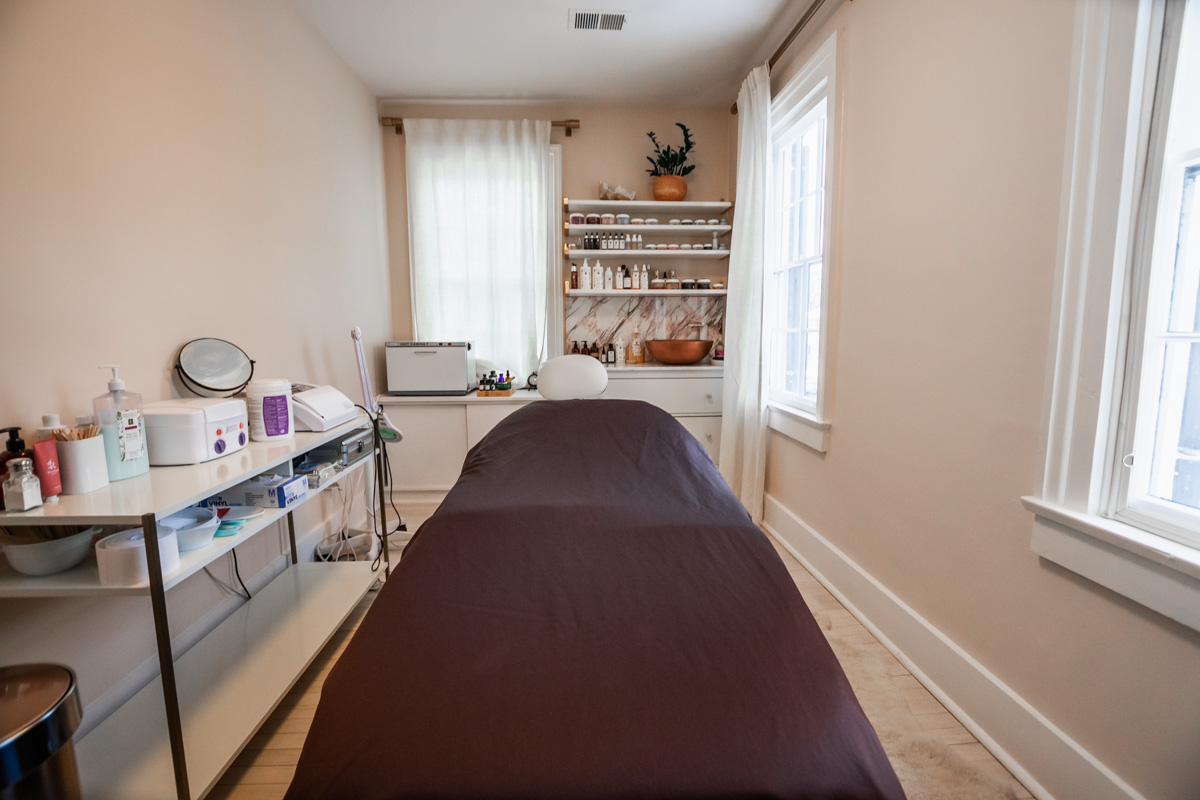
Jessica Goniea, licensed esthetician and certified aromatherapist at Jessica’s Apothecary.
Graphic by Jessica Pace | Washtenaw Voice
by DOINA PLOP
Deputy Editor
Besides its frightening, well-known challenges and consequences, the COVID-19 pandemic is also to blame for several skin issues.
In Michigan, with the cold winter weather also comes seasonal skin dryness. This year, due to the COVID-19 necessary preventive health measures — like frequent hand washing — that dryness was exacerbated.
Additionally, due to prolonged use of masks, many are developing maskne.
The U.S. Dermatology Partners, the second-largest physician-owned practice in the U.S., define maskne as “a form of acne mechanica that causes breakouts in the areas covered by a face mask – the jaw, cheeks, nose, chin, and around the mouth.”
Jessica Goniea is a licensed esthetician, certified aromatherapist, and owner of Jessica’s Apothecary in Ann Arbor. She said several of her customers are experiencing congestion in the mask area.
Pamela Greener, an acne specialist at Vis-a-Vis Spa & Salon in Ann Arbor, said many of her clients struggled with dehydration, dryness, and more breakouts because of the changing temperatures and the COVID-19 pandemic.
Greener said “lack of sunlight, more binge eating, less exercise, and over-drying the skin due to artificial heat indoors” may be some factors that contributed to that trend as well.
“The biggest challenge in winter is keeping the skin barrier intact and healthy,” said Goniea.
This year, with safety measures, health concerns, and financial instability — the challenge was greater.
“If the skin has a disturbed barrier function, then it can exacerbate all kinds of issues like fine lines, rosacea, and acne.
“Making sure to have a balance in the cleansing approach will lessen how much certain conditions are exacerbated by wearing the mask,” said Goniea.
According to Goniea, rosacea is a condition exacerbated by heat so if someone is wearing a mask in a hot environment or if it’s very humid in the mask, their condition is likely to worsen.
For those suffering from rosacea, Goniea recommends using a creamy cleanser –that leaves a protective lipid barrier on the skin and doesn’t cleanse past the protective oil-water barrier– and avoiding harsh cleansers.
To prevent maskne, experts advise to cleanse and moisturize the face before and after wearing a mask, to change or wash the mask daily, and carefully choose the type of mask.
For more information about how to prevent and treat maskne visit the US Dermatology Partners website or consult your dermatologist.
Spring relief?
With the arrival of spring and more doses of vaccines, estheticians hope that people will have more time to care for their bodies.
“People have to adjust their regimen. In summer we have humidity in the air that helps to keep the hydration level higher, but in the winter people need to layer products or use a richer product—with higher lipid content—to protect the skin against moisture loss,” said Goniea.
Greener said eating a balanced diet, drinking plenty of water, exercising, and having a good skincare routine can help to keep the whole body healthy. Her ideal morning and nighttime skincare routine should include a cleanser, toner, serum, moisturizer, and SPF for daytime only.
Goniea encouraged those on a tight budget to at least cleanse and moisturize morning and night.
For a more accurate and personalized skincare routine, one should consult with an esthetician.
Use products properly
One should pay attention to the order of application of the products. “Sometimes you could be wasting products formulated with good ingredients by applying them in the wrong order. Go from water-based products to oil-based,” said Goniea.
Greener and Gonia also recommend checking the ingredients because poorly formulated products can be bad for the skin. Greener suggests checking the ingredients on the Environmental Working Group website.
“There are so many skincare products out there it can get confusing. The FDA does not regulate health and beauty products as they should,” said Greener.
Another area that needs care and attention is the lips. When shopping for a good lip balm, the specialists suggest avoiding ingredients like petroleum and peppermint. “There’s usually too much peppermint in lip balms. Anything over one percent formulation of peppermint is drying to the skin,” said Goniea.
According to Goniea, ingredients like beeswax, plant-based oils, shea butter, and hydrating essential oils (like orange and grapefruit) should be preferred.
“White Lotus Farms makes a really affordable, locally made lip balm,” said Goniea.


